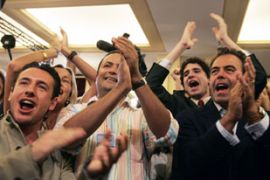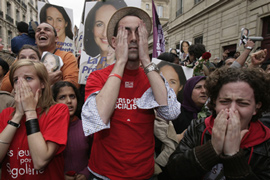Sarkozy’s bloc ‘wins’ French poll
Poll forecasts show the right has failed to secure a widely-expected landslide.

Polling stations opened at 8am (0600 GMT) with reports suggesting the UMP was looking to increase its seats in the outgoing parliament from 359 to 400 or more.
About 35 million voters are choosing National Assembly deputies in 467 constituencies where there was no winner in the first round a week ago.
The participation rate could help determine the size of the presidential majority, with a high turnout helping the Socialists.
Segolene Royal, the defeated Socialist presidential candidate who topped the presidential vote in almost 200 constituencies, has urged left-wing and centrist voters to turn out to clip the wings of Sarkozy’s right-wing parliamentary domination.
The first-round parliamentary vote a week ago saw a record low voter turnout of barely 60 per cent.
The first round saw 110 seats filled outright – all but one by UMP members – in constituencies where a single candidate took more than 50 per cent of the vote. The 467 remaining seats went to the runoff.
Sarkozy had urged voters to back his agenda for change with a powerful majority and his start to his presidency has proven popular with voters and driven the right’s campaign.
Socialist crisis
The Socialists have been in crisis since the presidential election in May and have tried to play on the fear that a huge majority for Sarkozy would render parliament a rubber stamp for his policies.
 |
| Disappointed socialists were urged to vote to curb a large UMP gain [AFP] |
Sarkozy’s government has already scheduled an extraordinary session of the new parliament for June 26 to begin passing some of his reforms.
Those include loosening the 35-hour work week, guaranteeing minimum service during public-transport strikes and getting tough on repeat lawbreakers and illegal immigration.
Over the two rounds of voting, independent centrists and extremist parties were likely to be the biggest losers.
The UDF party of Francois Bayrou was expected to win just two or three seats, the Greens between two and four, the Communists up to 16 and the far-right National Front none.
VAT fear
Looking for a weak spot in the Sarkozy machine, the Socialists most recently seized on government hints of a possible increase in sales tax.
Socialist candidates hung signs in their offices: “June 17, Vote against the VAT at 24.6 per cent.”
The issue of a sales-tax increase, meant to help pay for social security, left Sarkozy disarmed for the first time since he took office on May 16.
On Thursday, he repudiated any increase “that would reduce the buying power of the French”.
The French president is expected to quickly complete his governing team after Sunday’s vote.
Half a dozen or so junior ministers could include ethnic minority figures, non-UMP politicians and maintain a rough ministerial parity between the sexes.